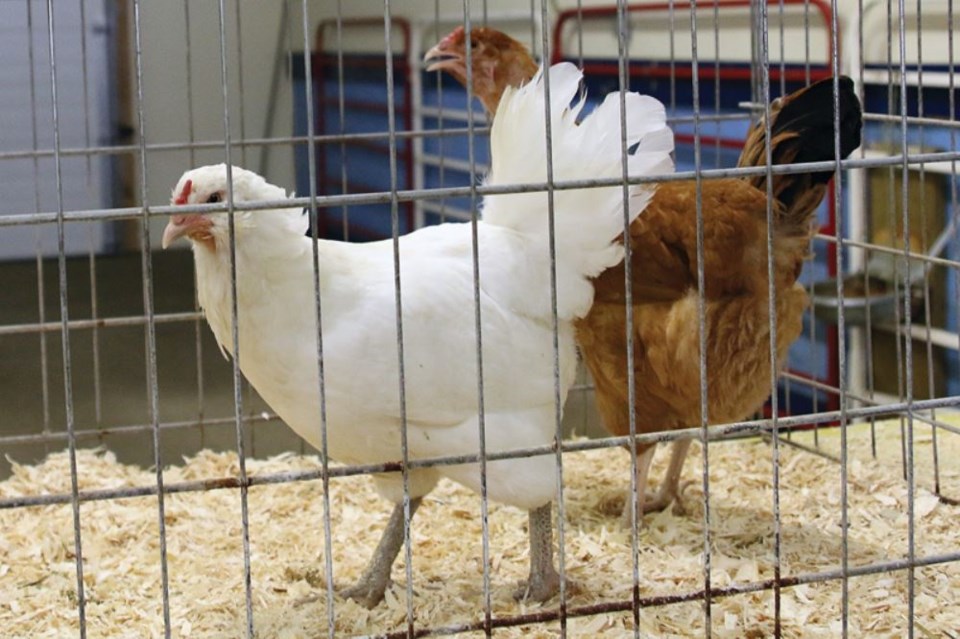THUNDER BAY – A proposal to reconsider allowing urban residents to keep chickens was soundly defeated by city council Monday, with even a long-time champion of the idea turning against it.
The motion failed on a 10-3 vote, with only councillors Andrew Foulds, Cody Fraser, and Shelby Ch’ng, who moved it, voting in favour.
Ch’ng had supported a 2016 push to amend city bylaws to allow urban chicken keeping, along with Foulds, Rebecca Johnson, and then-councillor Linda Rydholm. On Monday, Johnson said she could no longer support the idea.
“I was certainly a cheerleader in 2016 for this whole issue – I felt very strongly about it,” she said. “I can’t say I’m in the same position in 2020. I’d rather defeat this at this point in time, because I don’t know the community is ready to go forward. The research has changed considerably since 2016, and I just feel this is not in the best interest of the community at this point.”
A proposed amendment from Johnson to defer consideration of the question until September was also defeated.
Several councillors questioned the point of re-litigating an issue that underwent significant study, consultations, and debate four years earlier. Ch’ng’s motion would have directed city administration to advise on what it would take to update that work so the issue could be reconsidered.
“I think I know what I need to know about it,” said Coun. Mark Bentz. “I’ve gotten a lot of feedback from folks in the community, [much] of it non-supportive. Yes, there are merits to the idea, but I think there’s more downside than upside to bringing livestock into urban areas.”
Public sentiment to the idea has cooled since 2016, suggested Coun. Aldo Ruberto. The at-large councillor voted against it four years ago, but recently suggested he’d be open to considering it if proper enforcement was in place.
“I’ve had numerous calls, more so than in 2016, [when] I got a lot of calls in support,” he said. “This time, it’s the exact opposite. People are saying, why are you bringing this up now, we don’t want this – and they’re adamant about it.”
Infectious disease was the primary concern for Coun. Brian McKinnon, while he also worried the practice of keeping chickens would create nuisances like smell, noise, and pests.
“When I was a kid, we had lots of chickens in the city,” he said. “But we had lots of rats, too.”
Ch’ng cited threats to food security from the COVID-19 pandemic as the primary reason the issue needed a second look, while noting council’s composition has changed significantly since the previous vote.
“I believe we’re living in a different day than when this first came to council in 2016,” she said. “If you want to believe our food systems are not at risk, denial is a perfectly valid response to an overwhelming situation. We’ve become very complacent in our attitudes to food security, but I cannot deny the risk I see for us.”
Ch’ng pointed to disruptions to migrant farm labour, shut-downs at meat-packing plants, and pollinator shortages as examples of how the pandemic had revealed vulnerabilities in the industrial food system. Many of her colleagues agreed that food security was a growing concern, but didn’t see allowing urban chickens as a viable solution.
“If it passed, the uptake would be minimal at best,” said Coun. Kristen Oliver. “Raising backyard chickens is really a luxury. Between ensuring adequate chicken coops, the feed, and proper cleaning protocols, the costs would make it prohibitive to do this properly, especially for low-income and marginalized people.”
“The food security issues are legitimate, and the pandemic we’re all living with right now has underscored [that],” said Mayor Bill Mauro. “But I think it’s a bit of a stretch to link backyard chickens with any ability to address food security issues.”
Coun. Cody Fraser agreed the change likely wouldn’t make much of a dent in local food security issues, but said that shouldn’t rule out considering it. There would be educational value for children in seeing where food comes from, the Neebing ward councillor added.
It’s a proposal Mauro said he’d be open to under normal circumstances, but with the COVID-19 pandemic straining city resources, he didn’t believe it was the right time to pursue it.
“This is not something we’d be recommending we sink our teeth into at this time,” Develoment Services manager Mark Smith told councillors, saying administration was preoccupied with a number of immediate concerns related to the pandemic.
